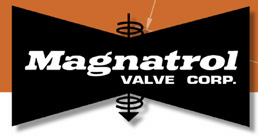
BRONZE SOLENOID VALVE
"GRITTY COOLANT"
FULL PORT - NORMALLY OPEN
1/2" TO 1" PIPE SIZE
NO DIFFERENTIAL PRESSURE REQUIRED TO OPEN

Specifications:
- Max. Fluid Temperature = 212°F
- Max. Static Pressure = 300PSI
OPERATION:
Valve closes when energized and opens when de-energized. When the coil is energized the plunger presses the poppet, closing the pilot orifice, and opens a bleed passageway to permit pressure to build above the piston and sealing it. Upon de-energizing the coil, the pilot orifice is opened, relieving the pressure above the piston, allowing it to leave its seat. The bottom spring allows the valve to operate at zero pressure drop.

CONSTRUCTION:
(∗Wetted parts)
- ∗Valve Body - Cast Bronze, Globe Pattern - NPT ends
- ∗Piston - Cast Bronze
- Coil Enclosure - Malleable or Cast Iron, 1/2” NPS conduit conn.
- ∗Plunger - 430 Stainless Steel
- ∗Poppet - 303 Stainless Steel
- ∗Stem - 303 Stainless Steel
- ∗Bonnet Tube - 304 Stainless Steel
- ∗Spring - Inconel and 302 Stainless Steel
- ∗Body Seal - Buna N or Non Asbestos Gasket
- ∗Orifice Seal - Buna N (Viton or Glass Filled Teflon available)
- ∗AC Shading Coil - Copper
- ∗Stem Pin - 304 Stainless Steel
- Coil - Encapsulated Class B, 18” leads - (Class H available)
APPLICATION:
To control the flow of "Coolant", the valve is designed with the piston "turned down" and a larger pilot port, offering additional clearance, allowing the valve to operate with fluids containing some grit/sediment typically found in coolant. Valve operates from zero to maximum differential pressure indicated in table. Valve must be mounted in horizontal pipe with solenoid enclosure vertical and on top.
Contact Automatic Controls Company for more information.
Return to Top of Page
NO DIFFERENTIAL PRESSURE REQUIRED TO OPEN
-
Specifications:
- Max. Fluid Temperature = 212°F
- Max. Static Pressure = 300PSI
Valve closes when energized and opens when de-energized. When the coil is energized the plunger presses the poppet, closing the pilot orifice, and opens a bleed passageway to permit pressure to build above the piston and sealing it. Upon de-energizing the coil, the pilot orifice is opened, relieving the pressure above the piston, allowing it to leave its seat. The bottom spring allows the valve to operate at zero pressure drop.
-
CONSTRUCTION:
- ∗Valve Body - Cast Bronze, Globe Pattern - NPT ends
- ∗Piston - Cast Bronze
- Coil Enclosure - Malleable or Cast Iron, 1/2” NPS conduit conn.
- ∗Plunger - 430 Stainless Steel
- ∗Poppet - 303 Stainless Steel
- ∗Stem - 303 Stainless Steel
- ∗Bonnet Tube - 304 Stainless Steel
- ∗Spring - Inconel and 302 Stainless Steel
- ∗Body Seal - Buna N or Non Asbestos Gasket
- ∗Orifice Seal - Buna N (Viton or Glass Filled Teflon available)
- ∗AC Shading Coil - Copper
- ∗Stem Pin - 304 Stainless Steel
- Coil - Encapsulated Class B, 18” leads - (Class H available)
(∗Wetted parts)
To control the flow of "Coolant", the valve is designed with the piston "turned down" and a larger pilot port, offering additional clearance, allowing the valve to operate with fluids containing some grit/sediment typically found in coolant. Valve operates from zero to maximum differential pressure indicated in table. Valve must be mounted in horizontal pipe with solenoid enclosure vertical and on top.

